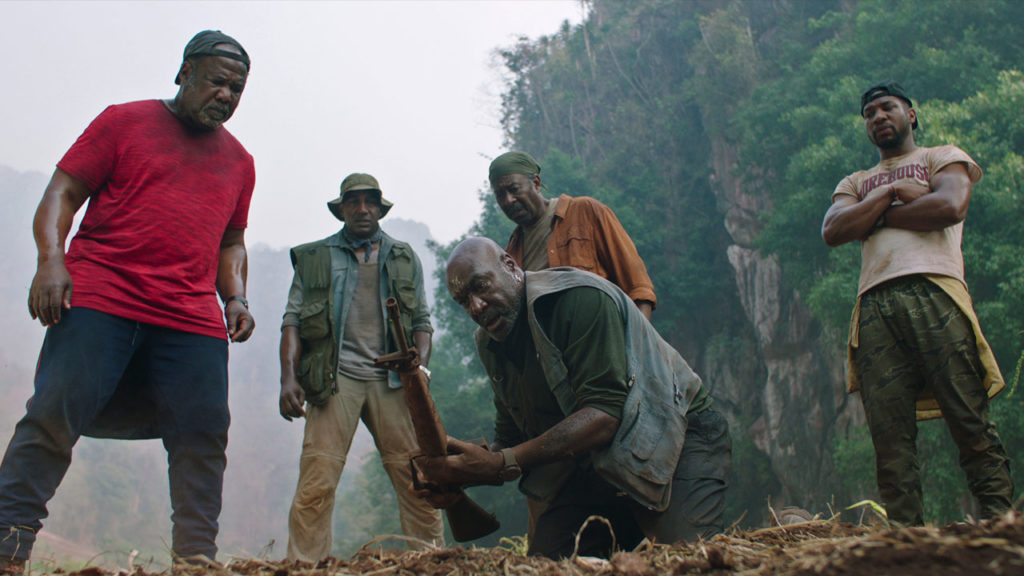A Spike Lee joint is a hurricane. There’s a force and velocity to it that’s unstoppable. What’s it destroying in its runtime? Your perspective. You don’t make a hurricane move, you have no choice but to succumb to its power and force. Da 5 Bloods hurricanes through the Vietnam War, giving us a compelling story and powerful history lesson you can’t help but batten down the hatches and hunker in for because of Lee’s power and brilliance behind the camera: the eye of this hurricane.
Da 5 Bloods are a tactical powerhouse battalion fighting during the Vietnam War. Their leader, Stormin’ Norman (Chadwick Boseman) perished in the jungle and was left behind. The rest of his unit: Otis (Clarke Peters), Eddie (Norm Lewis), Melvin (Isaih Whitlock Jr.), and Paul (Delroy Lindo), return to Vietnam in their old age to find Norman’s remains and send them home. Paul’s son David (Jonathan Majors) also is there, trying to reconnect with his dad; in fact, all the Bloods are coping, individually and as a unit, with their pasts as they progress through the Vietnamese jungle.
Spike Lee’s style and deep understanding of the African-American experience in the United States help generate that overwhelming propulsive force that keeps the viewed planted in their seats. The first hour of this movie Spike establishes his tone and style. We get lots of scenes of black men talking about the black army experience to their other black friends, bringing up people and situations everyone knows, but through an entirely different racial filter. President Trump is referred to as President Bone Spurs, because he claimed he had bone spurs in his ankle to get out of serving in the Vietnam War. Conversely, Muhammad Ali was vilified at the time for draft dodging, going to prison for it and stripped of his titles. In the black community? He was a hero for pointing out the oppression blacks face in the United States, and not wanting to perpetuate that oppression onto other countries, like Vietnam. Long winded as these discussions may be, Lee uses them to put the audience in the right frame of mind to tell his story. In addition, the talented director uses his uncanny ability to tie in past, present, and future, while having this discussion among his characters, making them all feel fluid and connected, in conversation with one another. Lee also blends in reality with his story, lending legitimacy and import to his already compelling story.
Another way Spike Lee generates power is by crafting complex, compelling black characters voiced by usually underutilized black talent, doubling the magnitude of the character. Delroy Lindo has been making great movies all over Hollywood since 1974, and has been a stalwart for Spike Lee for years (I personally will never forget his character in The Cider House Rules). Lee unleashes him here; Lindo has these big eyes that draw you in with their intensity, making you listen to what he has to say, or what he’s going through. In this case, Lindo’s Paul, of all the Bloods, left the most behind in that Vietnamese jungle; going back triggers him and also allows him to confront his demons. The Wire vets Clarke Peters and Isaiah Whitlock Jr. are always welcome presences too; Peters has a nice little story, and Whitlock delivers one of his patented “SHEEEEEEEETTTT!”s to the delight of Wire fans. Jonathan Majors is also deserving of a bigger platform, playing the younger, steadying hand to all these old fogies.
Like all Spike Lee joints, Da 5 Bloods’s hurricane left parts of my perspective in tatters. But rebuild I shall. And like all powerful hurricanes, I’ve learned from them, and grown to respect their power by rebuilding from the ground up, stronger and more knowledgeable than ever. At least until he, Delroy Lindo and whomever else is in the eye of the hurricane forces me to attention again.

